|
|
|
Sort Order |
|
|
|
Items / Page
|
|
|
|
|
|
|
| Srl | Item |
| 1 |
ID:
156211
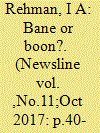

|
|
|
| 2 |
ID:
179262
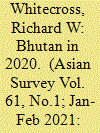

|
|
|
|
|
| Summary/Abstract |
The year 2020 in Bhutan was dominated by the coronavirus pandemic, a decline in state revenues, and territorial claims by China. In 2019, Bhutan’s strong economy suggested that the country would graduate from the least developed country category in 2023. The economic impact of the coronavirus pandemic on the economy makes this less certain.
|
|
|
|
|
|
|
|
|
|
|
|
|
|
|
|
| 3 |
ID:
168653
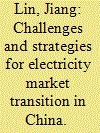

|
|
|
|
|
| Summary/Abstract |
China is currently pursuing electricity reforms that will create wholesale markets for electricity. Electricity markets hold considerable promise for facilitating China's transition to clean energy systems, but face obstacles. The most significant obstacle to market reforms is their potential financial impact on coal generation, which currently accounts for most of China's generating capacity. In this paper, we examine the impact of market reforms on coal generation in China, using Guangdong Province as a case study. We find that, in the near term, market prices are likely to lead to significant decreases in net revenues for coal generators relative to the current benchmark tariff, with 40%–60% of coal generation capacity unable to cover the cost of remaining in commercial operation. We estimate that existing coal generators in Guangdong had 94 billion yuan (US$14 billion) in outstanding debt in 2016, creating large risks for banks and raising questions about the potential impacts of electricity market reforms on China's financial industry. The impact of market reforms on coal generators creates two problems—transition and resource adequacy. The development of mechanisms for long-term resource adequacy provides a common solution to both of these problems.
|
|
|
|
|
|
|
|
|
|
|
|
|
|
|
|
| 4 |
ID:
152176
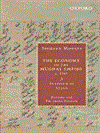

|
|
|
|
|
| Edition |
revised and enlarged ed.
|
| Publication |
New Delhi, Oxford University Press, 2015.
|
| Description |
xii, 476p.: maps, figurespbk
|
| Standard Number |
9780199450541
|
|
|
|
|
|
|
|
|
|
|
|
Copies: C:1/I:0,R:0,Q:0
Circulation
| Accession# | Call# | Current Location | Status | Policy | Location |
| 058994 | 954.0254/MOO 058994 | Main | On Shelf | General | |
|
|
|
|
| 5 |
ID:
188711


|
|
|
|
|
| Summary/Abstract |
While states and non-state armed groups often engage in militarised conflict over contested territory, at other times they co-govern in a tenuous equilibrium. Using a survey of over 1,600 Kurdish soldiers (Peshmerga) and elite interviews, we investigate local variation in shared governance in one such context – the disputed territories of northern Iraq. Despite the area being under Kurdish military control, the Iraqi government continued to provide services in districts where it had pre-existing infrastructural capacity. However, in revenue-producing districts, Kurdish actors appropriated infrastructural power to provide services themselves. This illustrates that non-state governance strategies, and their outputs, can vary locally.
|
|
|
|
|
|
|
|
|
|
|
|
|
|
|
|
| 6 |
ID:
122172


|
|
|
|
|
| Publication |
2012.
|
| Summary/Abstract |
The recent mining boom provides some Latin American countries with a fundamental new source of revenue, but can also pose some very significant threats to their stability and security. After a brief overview of recent regional developments, Elizabeth Deheza and Ugo Ribet assess the case of Colombia and scrutinise the security, socioenvironmental and political risks inherent to the country's current mining rush.
|
|
|
|
|
|
|
|
|
|
|
|
|
|
|
|
| 7 |
ID:
053778


|
|
|
|
|
| Publication |
Oct 2004.
|
| Summary/Abstract |
The passing of Law No. 18 of 2001 on 'Special Autonomy for the Province of Aceh Special Region as the Province of Nanggroe Aceh Darussalam' signified a major development in the Indonesian government's strategy to resolve Aceh's protracted conflict. Ratified by President Megawati Sukarnoputri on 9 August 2001, the 'NAD law' conferred unprecedented authority to Aceh over its internal affairs. This paper evaluates the challenges that have been involved in implementing the three main tenets of the legislation -- aspects of Syari'ah (Islamic law), the return of Aceh's natural resource revenue and a provision to hold direct local elections. The paper argues that the Megawati administration's failure to redress Acehnese grievances through special autonomy largely stems from its suspicion of the NAD law itself, its greater reliance on militaristic measures than on political policies in Aceh, and pre-existing systemic factors such as Aceh's dysfunctional state infrastructure, corrupt political culture and war economy.
|
|
|
|
|
|
|
|
|
|
|
|
|
|
|
|
| 8 |
ID:
097770
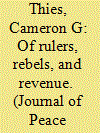

|
|
|
|
|
| Publication |
2010.
|
| Summary/Abstract |
This article investigates the relationship between civil war onset and state capacity through a focus on the role of primary commodities. This is accomplished by moving the focus of the civil war literature away from an almost exclusive concern with the incentives of rebels to a consideration of both rebels and rulers as revenue seeking predators. This predatory theory approach expects that higher levels of state capacity should deter civil war onset, while civil war onset should reduce state capacity. Further, natural resource rents are expected to enhance state capacity, rather than increase the likelihood of civil war onset. In order to deal with the endogeneity posed by including fiscal measures of state capacity in single equation models of civil war onset, this study employs a simultaneous equations framework. This framework allows us to capture the effects of civil war onset on state capacity and vice versa, as well as the effects of primary commodities on both endogenous covariates. The main findings from the statistical analyses include: state capacity does not affect civil war onset, but civil war onset reduces state capacity; and primary products directly affect only state capacity - they do not directly affect civil war onset, as found in previous contributions to the literature.
|
|
|
|
|
|
|
|
|
|
|
|
|
|
|
|
| 9 |
ID:
090371
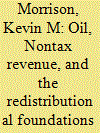

|
|
|
|
|
| Publication |
2009.
|
| Summary/Abstract |
Nontax revenues make up a substantial amount of government revenue around the world, though scholars usually focus on individual sources of such revenue (for example, foreign aid and state-owned oil companies). Using a theory of regime change that builds on recent models of the redistributional foundations of dictatorships and democracies, I generate hypotheses regarding all nontax revenue and regime stability. I argue that an increase in nontax revenue should be associated with less taxation of elites in democracies, more social spending in dictatorships, and more stability for both regime types. I find support for all three of these hypotheses in a cross-sectional time-series analysis, covering all countries and years for which the necessary data are available. Significantly, I show that the particular source of nontax revenue does not make a difference: they all act similarly with regard to regime stability and the causal mechanisms.
|
|
|
|
|
|
|
|
|
|
|
|
|
|
|
|
| 10 |
ID:
141086
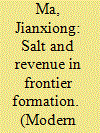

|
|
|
|
|
| Summary/Abstract |
This research reviews the formation of the Yunnan-Burma frontier since the 1720s, when the Qing government reformed the administrative systems from chieftainships to official counties in the middle and southern Yunnan mountains areas. One of some crucial political changes was the policy of salt revenue which directly stimulated large scale ethnic resistance in the region of salt wells. However, the social political context of continuing ethnic conflicts was not only rooted in the reshaping of the salt-consuming districts, but also rooted in social changes in the Yunnan-Burma borderland because of increasing Han Chinese immigration and their penetration into mining, long distance trade and local agriculture. In order to successfully control mountain resources as the base of revenue, the Qing government continued to gradually integrate native Dai chieftains into official counties. Local resistance continued and reached a peak from the 1790s to the 1810s. Pushed by the Qing government, and with the collaboration of different social actors, the synthesized mobilization of frontier formation had made ethnic politics a main style of social political reconstruction, even if commercial exchange, long distance trade, and demographic reshaping also continued to be mixed with ethnic politics as another layer of the Yunnan-Burma frontier formation.
|
|
|
|
|
|
|
|
|
|
|
|
|
|
|
|
|
|
|
|
|